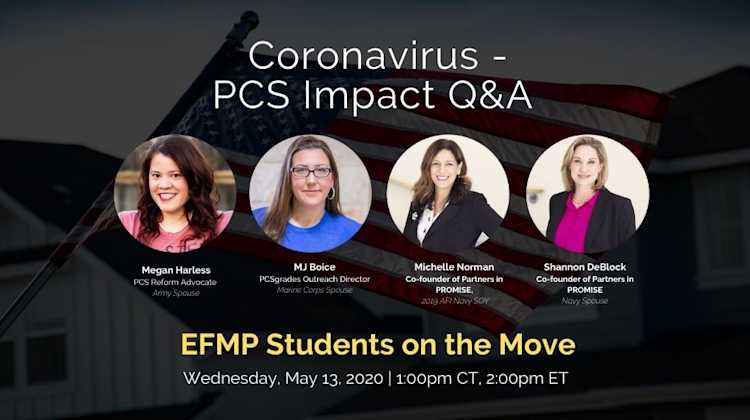The Added Challenge of PCSing With an Exceptional Family Member
by Rebecca Alwine - September 7th, 2022

There are so many challenges that come with a military move. From making new friends, to finding schools, to deciding what you should pack yourself, it can be overwhelming. Luckily, with the growth of the internet and websites like PCSgrades.com, relocating is getting a bit easier each year. But for military families with an exceptional member requiring medical specialists, moving can be a challenge.
Added challenges of PCSing with an exceptional family member
The Exceptional Family Member Program (EFMP) is operated by each branch, except the Coast Guard, which has its own program. The EFMP program ensures that family members have access to health care, housing, educational, and personnel services at their new location.
Enrollment in the program is required. Paperwork must be kept updated, so those assigning service members know what the requirements are for each family.
As you can guess, as with many aspects of PCSing, there are several things that can go wrong with this program. The intention of the EFMP is a great one. When it works the way it is supposed to, families feel confident that their needs will be taken care of. Long story short, it doesn’t always work the way it should.
Things to know about EFMP
For those of you not enrolled in the EFMP program, there are some key things to know before you can begin to understand the challenges. For the record, I think familiarity with the program is something every service member should have. As a leader, you need to know what your families are going through. As a service member, this may directly affect you one day.
Enrollment is mandatory in EFMP once a special need is diagnosed. This includes physical, mental, or educational needs. There are actual repercussions if it’s discovered you did not enroll your family member.
There are several different EFMP categories that determine what action needs to be taken. These range from temporary enrollment and monitoring to homesteading.
Every family requesting command sponsorship for an overseas location must get a screening to see if their needs can be covered at the overseas base.
Challenges of EFMP
When the Jordan family received their most recent set of orders, they were surprised to discover they were heading to an installation that could not provide EFMP services. Two of her children, along with milspouse Becca Jordan, are enrolled in the Marine Corp’s EFMP Program.
“We lived in Hawaii for almost nine years,” Jordan explained. “Mostly because it was nearly impossible to find another duty station that had the appropriate specialists within a reasonable drive.” When her family received last-minute orders to Camp Lejeune in North Carolina, Jordan had her work cut out for her. “There really wasn’t enough time to question or try to change the orders. We had three weeks. When we arrived, we made sure to update all the EFMP paperwork and were again told our only option was to apply for a humanitarian transfer.”
Jordan has been a Marine spouse for 17 years and is no stranger to the needs of the Corps, but she was disappointed this happened. “Rank, job, and positions available are something that has to be considered with reassignments,” she said. “There are a limited number of positions available for my husband, and sometimes we just have to deal.”
When they moved, Jordan put her career on hold to be a mom. Some of the doctors they need to see are states away from where they are stationed. “Our shortest drive to the doctor is an hour, and the farthest away is in Maryland. With three people needing to see multiple specialists, we spend a lot of time driving,” she said.
Get involved
While there are many times the EFMP works to help families, it can be relatively inconsistent. Jordan recommends that families get proactive. “Families are hesitant to enroll (though it is required) because they have heard negative experiences or don’t want to deal with the process,” she said. In 2013, the US Army’s Human Resource Command highlighted the importance of service members updating their EFMP paperwork. Almost 9,000 active component EFMP enrollments had expired, and 17% needed to be updated.
One of Jordan’s best practices is to get researching as soon as possible. “When we moved to Lejeune, we were able to see the pediatrician in a timely manner, and she submitted referrals quickly. However, our son experienced a flare and had to be hospitalized while waiting to see the specialist. There was a 3-6 month wait, he was going without medication he needed, and developed Stage 3 Kidney Disease,” Jordan recalled.
It’s not always possible to get appointments without a referral. But if you can research who takes Tricare and who has appointments available, it will help in the long run.
Another suggestion Jordan has is to put the needs of your family first. A lot of people are concerned about how enrolling in the EFMP program will negatively affect their service members’ career. She says she still has that concern, but the only way to improve the program is to get involved and give feedback.
EFMP in a perfect world
When we asked Jordan what she would change if she were running the EFMP at headquarters, her answer was simple. “I’d make the program work the way it was intended, so all EFMP families were able to move where they could get services,” she said. “In a perfect world, the EFMP programs and regulations would be universal across all the Department of Defense.”
PCSgrades.com is a community of military and veteran families helping each other with our biggest relocation needs. We collaborate with Partners in Promise to help EFMP families prepare for military moves. Together, we can truly make a difference!






